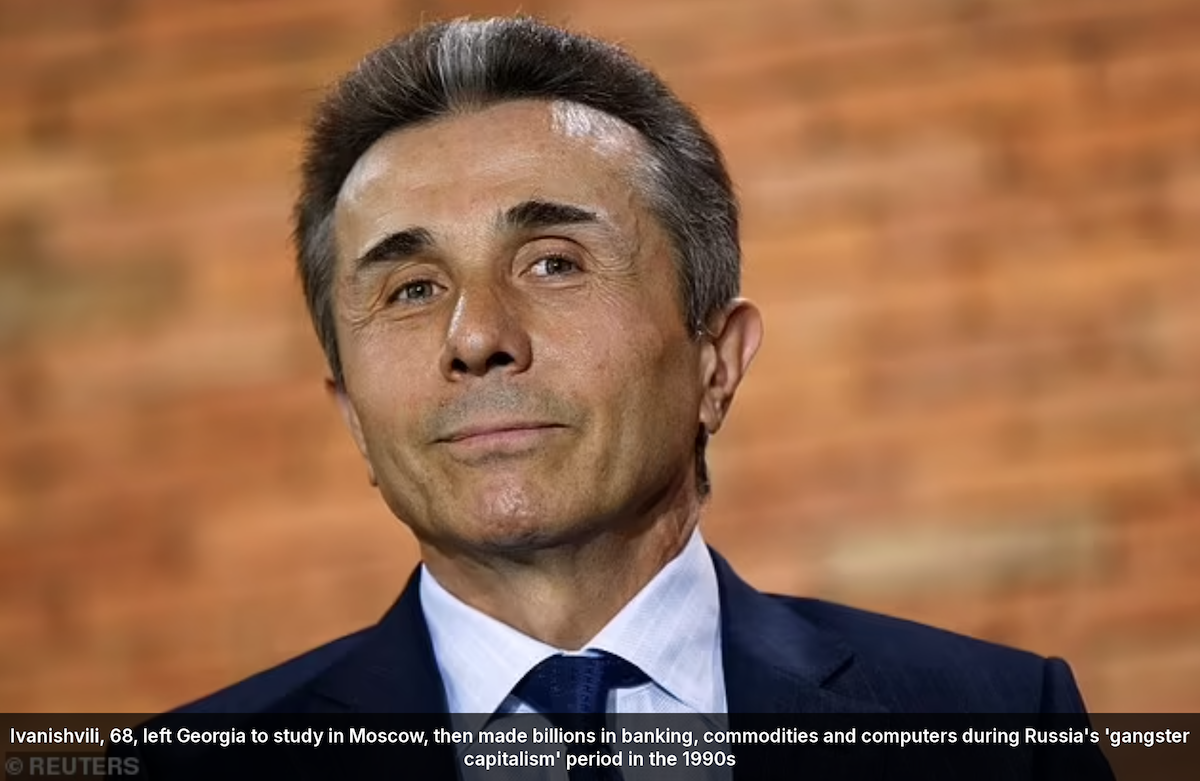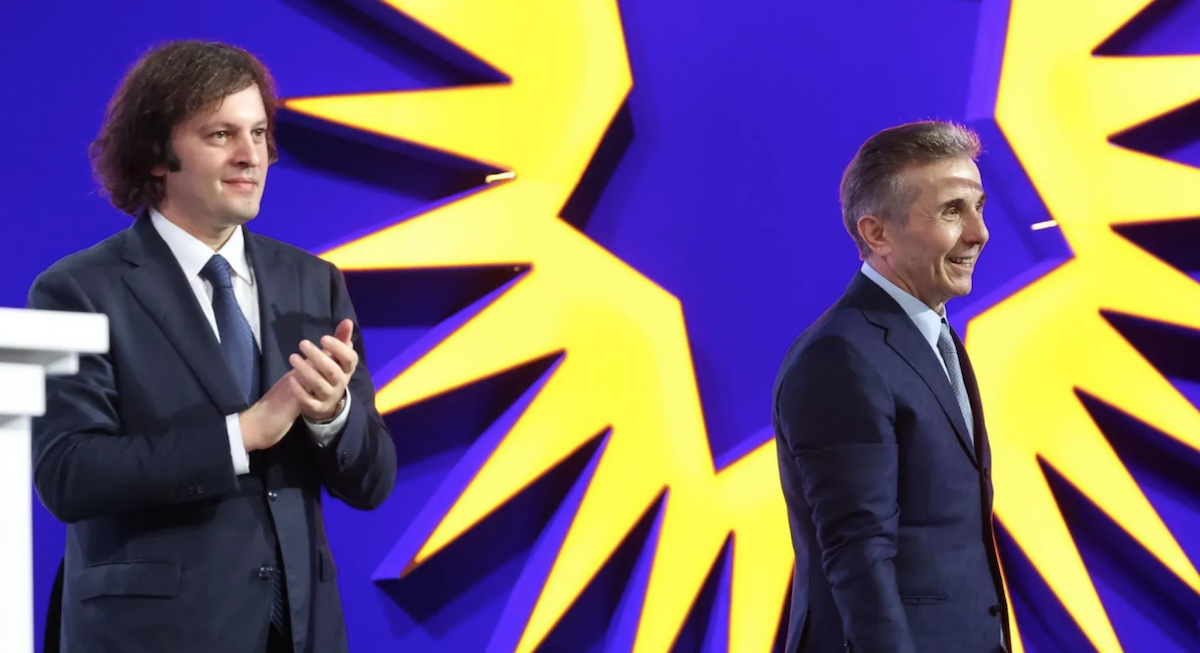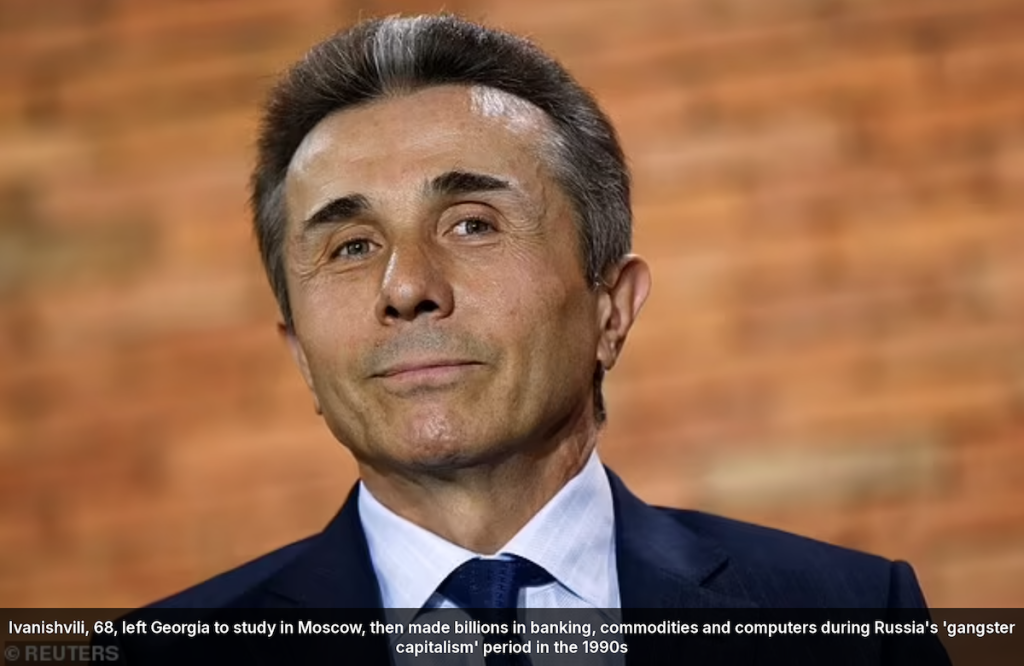Giorgi Bachiashvili, the former head of Bidzina Ivanishvili’s Co-Investment Fund and former confidante of the GD honorary chair, gave a long interview to the opposition-leaning TV Pirveli, in which he spoke about his case in the Georgian court and lifted the veil over the personality of the oligarch and his style of governance, as well as other issues.
Bachiashvili was financial advisor to Ivanishvili for several years. Georgian prosecutors have filed charges against Giorgi Bachiashvili for embezzling a significant amount of cryptocurrency and legalizing illegal income. Bachiashvili is accused of embezzling 8 253.13 bitcoins in 2017 worth $39,215,820 at the time (over $200 million in the current exchange rate). During a court session, Bachiashvili declared his innocence and pleaded not guilty. The court granted him bail in the amount of GEL 2,500,000, to be paid within 30 days. However, he is prohibited from leaving the country until the investigation is completed and must surrender his Georgian and Russian passports to the investigating authorities.
What is going on with Bachiashvili case
Bachiashvili said he has information that is crucial for Georgian citizens to know before they make a crucial decision for the country when they vote. He said that the case Ivanishvili has put together has amazed even the prosecutor’s office. He said the accusations against him are ridiculous and after he presented evidence in court, Ivanishvili even had to change his own testimony.
Bachiashvili said: “I am not afraid of his [Ivanishvili’s] court and prosecutors, there is a court in Strasbourg, and there I will be able to prove with documents – how he rules the judiciary, the prosecutor’s office, and how he fabricates cases.” He promised that everything will be revealed “in accordance with all procedures in court”, stressing that “Ivanishvili knows this” and that the Ivanishvili case “is ridiculous”.
The reason behind Ivanishvili suing him
For Ivanishvili, a good employee and team player is when you are a puppet, Bachiasvhili said. But as soon as his puppet gets his own ideas and does not follow him blindly, he becomes an “agent”, “traitor”, “enemy”, etc. for Ivanishvili.
Bachiashvili said that he helped Ivanishvili “in the most difficult financial case of his life” and that he was the one who discovered the irregularities with the Credit Swiss account and put together the legal team and the case. He said: “It was my professional duty and I did it so well that all the courts in Bermuda and Singapore ruled in his favor.”
Bachiashvili, on the other hand, said that he was a very bad example for the others in Ivanishvili’s team, as he was the only one who published in his social media posts condemning Russia when it invaded Ukraine. Similarly, when Bidzina Ivanishvili “started to demonize the West and change Georgia’s foreign policy course,” Bachiashvili expressed his different opinion, as he did not agree with the conspiracy theory that “some outside forces were interfering in the Credit Suisse case. It was crazy to believe that.” He said: “If any forces intervened in this case, they were all in favor of Ivanishvili. We won absolutely all the courts.”
While admitting that Credit Suisse tried to delay the case, for which it was reprimanded by the judge, Bachiashivli also stressed that “Patrice Lescaudron [the Credit Suisse employee at the center of the fraud] started emptying Ivanishvili’s accounts as early as 2006-2007, so, Bachiashivli said, it’s hard to imagine, even theoretically, that the “Global Party of War” would want to confront Ivanishvili at that time.
Money vs state interests
When asked whether he thought that Ivanishvili traded state interests for his money, Bachiashvili said that it’s “a fact it’s about the conflict of interests”, and “if you have a“complex” as you say, whereby your put your private interests before your country, you should not be in charge” [referring to the latest Bidzina Ivanishvili interview where he cited “a complex”, stemming from his being deprived of his money, as a reason why he was refusing to meet with Western partners] This is our reality, Bachiashvili said, that Ivanishvili trades with the country’s future. Bachiashvili said: “For him, keeping power and control over Georgia at any cost – that’s his task,” adding that Ivanishvili doesn’t care about the Georgian people and has never put the country’s interests before his own.
First steps in big business
Noting that Ivanishvili likes to position himself as a philanthropist with “clean hands,” Bachiashvili recalled how Ivanishvili made his big money in Moscow, when he established the bank “Rossiskiy Credit” and, according to Bachiashvili, took money from depositors, including Russian pensioners, bought assets with this money, which later made him a billionaire, and then told the depositors that he could not return the money and would give it back in 20 years in devalued rubles, while appropriating the assets”. “This was a simple fraud,” Bachiashvili said.
He dispelled the myth of Ivanishvili as a philanthropist, saying, “Philanthropy is always selfless. If you expect something in return, it is not philanthropy,” adding that “it is bribery.” He cited the so-called Offshore law rushed through and adopted by the GD, the passage of which went relatively unnoticed against the backdrop of the Foreign Agents Law. Bachiashvili illustrated the benefits of the law for Ivanishvili, citing the example of his 2022 purchase of a collection of paintings worth 1 billion. According to Bachiashvili, the law will save Ivanishvili and deprive the state budget of $400 million this year alone, as Ivanishvili will not have to pay VAT, income tax and property tax on this asset.
What are Ivanishvili’s plans
Bachiashvili said that in order to understand what Ivanishvili wants and plans, “it is important to listen … and accept that it is a lie.” He further said: “Because Ivanishvili never tells the truth.” Then he said: “This man is crazy with his power, and the more time passes, the more he clings to power.”
“The judiciary, the prosecutors, the PR machine – they all obey him. Those who do not obey him are traitors, agents, ‘people without a homeland’ and so on,” Bachiashvili said.
Asked whether Ivanishvili really believes that everyone around are agents, and Global War Party, Bachiashvili said: “Unfortunately, when people appear these narratives long enough they start to believe them.”
Elections
Asked about this message to Georgians going to the polls, he said, “It’s not about choosing who will be the prime minister and a minister, these are the first elections in our history when the future of our country is at stake and our foreign policy path is at stake”. He added: “So all those people who want their children to grow up in a democratic country and not be persecuted in the streets and followed by the security services, they should vote for Europe and it’s up to them which opposition party they choose.”
What information does Bachiashvili posses
Bachiashvili said he has have lots of information and can reveal a lot, “but we have to stop changing governments with clandestine documents.” “Ivanishvili has already exposed himself…He promises repressions and prosecution and then creation of an acceptable “opposition”” just how this was done in Russia, Bachiashvili noted. He also said that for years under Ivanishvili rule, the state apparatus and his own party “have been cleansed of pro-Western individuals.” As a result no self-respecting company comes as an investor in Georgia, he noted. He further added that “investments are not made through the proper channels as they should be in a democratic country.”
He also spoke of corruption schemes in the gas and electricity sectors, controlled by people from Ivanishvili’s close circle, who own the intermediary companies with money flowing into their pockets.
Why Ivanishvili damaged relations with the West
According to Bachiashvili, it was clear to Ivanishvili in 2022 that his autocratic style of governance was not compatible with the EU. So he decided to demonize the West and the EU. He used Credit Suisse to do so. Then, according to Bachiashvili, he began to publish letters through his “experts” in which he would develop these conspiracy theories in order to influence public opinion.
Ivanishvili governing style
Citing his own example of Ivanishvili never meeting with him after he decided to file a complaint, Bachiashvili described the oligarch as a person who avoids accountability for his actions: “He never meets with anyone who can demand accountability from him. That is why he never meets with politicians.” He never even participated in a court case where he was right, as he was afraid of questions, Bachiashvili said adding that Ivanishvhili produced an allegedly forged doctor’s report that he could not fly. “His style is to avoid responsibility,” said Bachiashvili adding that that even when he was not officially in power, Ivanishvili was regularly visited by ministers, prosecutors and judges and adding that he gave them orders.
He said: “Ivanishvili wants Georgia to be his court, so that he can decide whenever and whatever he wants to do, and that no one asks him anything and that he bears no responsibility for anything.” He added that the honorary chairman of the GD likes to stay in the shadows while he has his “puppets”. But, he said, the Georgian people understood that “if you don’t like a spectacle, it’s not the puppets that should be changed, but their master”.
On connections with Russia
Asked if Ivanishvili still had connections and if he ever explained why he needed property in Russia (the reports of which surfaced recently), Bachiashvili said he had never inquired because it was none of his business, but that “it is impossible, when you have such a business empire in Russia and when you take out such amount of money, not to leave people, property and connections behind.
What kind or leader is Ivanishvili
Bachiashvili said he’ an “autocratic leader avoiding responsibility for his actions” and noted that Ivanishvili has been methodically “dividing people.” “He only loves himself, and after then only family, country,”- was another description of the oligarch. “Any good staff he had, they all left, only those who have nowhere to go are left. Free person does not exist for him, only puppets,” former aide of Ivanishvil said. He also said: “He sees people as his resource. Many people are afraid of him, they are driven by fear. They are enslaved.”
Also Read:



